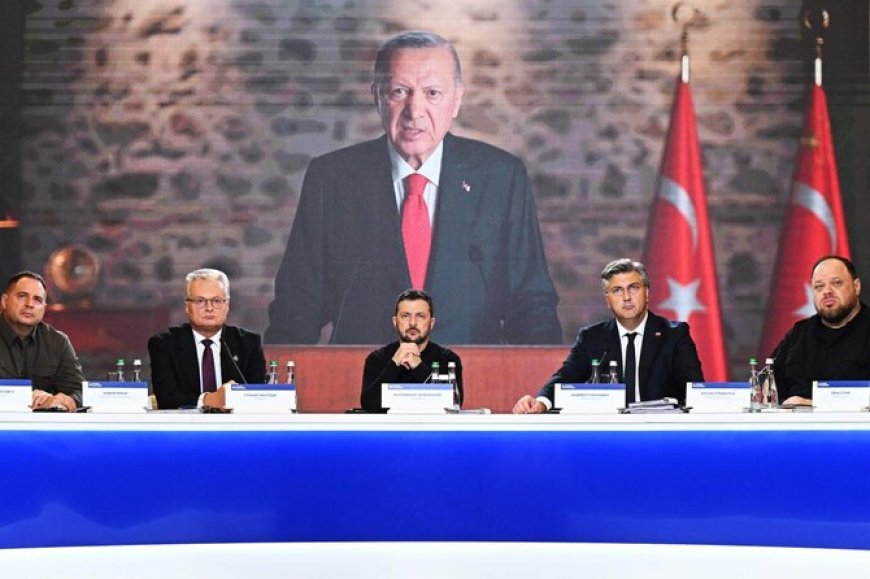Kremlin Rejects Erdogan's Call for Crimea's Return to Ukraine, Cites "Divergent Opinions"

The Kremlin expressed firm disagreement with Turkish President Tayyip Erdogan’s recent remarks calling for Crimea’s return to Ukraine. Kremlin spokesman Dmitry Peskov, responding to Erdogan's comments, emphasized on Friday that Russia’s stance on the status of Crimea, which it annexed from Ukraine in 2014, remains unchanged.
Peskov addressed Erdogan’s statement that Turkey’s support for Ukraine's territorial integrity and sovereignty is unwavering, and that the return of Crimea to Kyiv's control is a requirement under international law. Peskov countered this position, stating, "Here we have completely divergent opinions. At the same time, we do not abandon our deliberate attempts to explain to our Turkish friends and colleagues our point of view, our position."
Diverging Views on Crimea
The Crimean Peninsula, historically significant and strategically located, has been a point of contention between Russia and Ukraine since Moscow’s annexation of the territory in 2014. Turkey, a NATO member, has consistently backed Ukraine’s territorial integrity, including Crimea, a stance that often places Ankara at odds with Moscow.
Erdogan’s recent comments come amid increased diplomatic engagement with Ukraine and signal his continued support for Ukrainian sovereignty. However, Moscow has firmly rejected the possibility of returning Crimea, which it views as a critical part of the Russian Federation. The Kremlin’s opposition to Erdogan’s remarks highlights the growing complexity of Russia-Turkey relations, especially in light of their differing positions on key geopolitical issues.
U.S. Pressure on Turkey's Relations with Russia
Peskov also acknowledged that Turkey is under pressure from the United States over its close economic ties with Russia. “The U.S. is exerting undisguised pressure on the Turkish Republic, not shying away from intimidation, with consequences for the Turkish economy,” Peskov said. This pressure stems from Ankara's balancing act between maintaining its relationship with Moscow while also navigating its responsibilities as a NATO member and managing its partnership with the West.
Turkey has faced U.S. sanctions and other economic threats due to its cooperation with Russia, including energy agreements and defense contracts, such as Turkey's purchase of the Russian S-400 missile system. Erdogan's careful diplomacy reflects Turkey’s need to mitigate the impact of these external pressures without entirely sacrificing its economic ties with Russia.
Russia-Turkey Relations: A Diplomatic Balancing Act
Despite their disagreements over Crimea, Russia and Turkey maintain significant diplomatic and economic relations. Turkey has played a critical role as an intermediary between Russia and Ukraine during their ongoing 2-1/2-year conflict. Notably, Turkey facilitated the Black Sea grain export deal, which allowed Ukrainian grain to reach global markets despite the war.
The Kremlin has suggested that Russian President Vladimir Putin may visit Turkey for talks with Erdogan in the near future, pending the completion of preparations. These discussions would likely address a range of issues, including economic cooperation, regional security, and ongoing efforts to manage the conflict between Russia and Ukraine.
Earlier this year, Erdogan offered to mediate between Russia and Ukraine to help bring an end to the conflict. While Turkey has positioned itself as a neutral party in some aspects of the war, the Kremlin has not yet responded to Erdogan’s peace initiatives.
The sharp differences over Crimea underscore the complicated nature of Russia-Turkey relations. While the two nations continue to engage diplomatically and economically, deep-seated disagreements on key issues like Crimea remain unresolved. As Turkey navigates its relationships with both Russia and the West, its role as a mediator between Moscow and Kyiv will likely be tested further in the coming months. The possibility of future talks between Erdogan and Putin may offer a platform to address some of these challenges, but the divide over Crimea appears to be as entrenched as ever













































